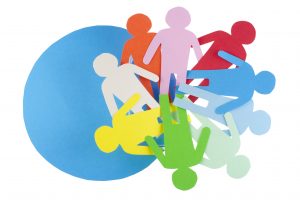
Welcome to my space for the reflections on topic 3 – Learning in communities – networked collaborative learning.
I joined the webinar “Learning in communities” on Monday the 7th November with Kay Oddone (Charles Sturt University, Australia) & Lotta Fröjdfeldt (Mälardalen University, Sweden). Little did I know, once again an inspiring and wonderful hour would pass so quickly on my ONL journey. I really believe that learning is a social act rather than an individual as such. I learn better in a team and learn from as well as with others. As a librarian, I’ve been teaching classes on site for years and in the last two years that has mostly moved to the online space. So, learning in communities, also known as networked collaborative learning, is a type of education that involves individuals working together in small groups or larger networks to learn new skills and knowledge. This is exactly what my teaching sessions are about. My groups are clearly predefined, and I may give a database introduction to about 30 people for 90 minutes. This learning can take place online via Zoom and I have my very own small online communities for this time. One of the key advantages of learning in this communities is that I allow my students in a twenty-minute breakout room to share their knowledge and experiences with the others about the database, which helps to deepen their understanding of the database right away. Additionally, working with others can provide opportunities for my students to receive feedback on their work, which can help to improve their skills and knowledge. The students I have are beginners, who are 2 months in theirs studies. So, another benefit of networked collaborative learning is that it can help to build strong connections and relationships between my students, which can foster a sense of community and support. This can be particularly important for students who may feel isolated or disengaged from traditional forms of education. The input that I give regarding the database is really small and part of a bigger online course. Nether than less I think that, learning in communities offers a number of benefits for learners, including the ability to share knowledge and experiences, receive feedback on their work, and build connections with others. As a result, this approach to learning has become increasingly popular in recent years. And if you ask me, it’s the future of learning. Because… Learning is a social act – don’t you think?
Bibliography
ONL222 Topic 3: Learning in communities – networked collaborative learning. (2022, Oktober 31). Open Networked Learning. https://www.opennetworkedlearning.se/onl222-course-overview/onl222-topic-3-learning-in-communities-networked-collaborative-learning/
5 responses to “Learning is a social act – don’t you think?”
Well, I see this as “one form” of learning for “some” subjects. I very much learn “on my own” – so learning is not a social act per se, but it CAN be – especially when they are on such fuzzy ground as it is based on human opinions rather than facts. Of course you can learn in a group and “from” others. In that respect I agree! Then that is a social “transfer”. And – of course if we humans are social beings, so community is important. But maybe I am more of a “passive” consumer. I feel listening to social discussion takes so much time – compared to quick reading a document.
Yes, learning in groups can make so much sense and as you describe, it helps students to bond which is very valuable especially at the beginning of their studies. It encourages students, they can ask questions and solve problems and it makes things easier and often more fun to study together.
Hi Stefanie,
I believe that learning on the whole is social. However, there are times where a little solitude enhances learning.
e.g. before weekly ONL meetings, I set aside time for quiet reading so as to go through the topic’s recommended readings.
During this time, I don’t want to be disturbed so that I can fully immerse myself into the new content and domain. But once the “homework” is done, I look forward to meeting my coursemateys and have a nice social interaction.
So, I agree with you that Learning is largely a social act 🙂
Hi Stefanie,
I very much agree with your and Benedicts reflections on learning as a social act. And yes, also quiet time for reading and reflection are essential parts of individual learning. Nevertheless, regardless of the field, learning is very much a social act as can be seen in the importance of meaningful discourse, exchange of intellecutal input, dialogue, and interaction in spoken and written form.
Best,
Christoph
“…working with others can provide opportunities (…) to receive feedback on (…) their work, which can help to improve (…) skills and knowledge.”
True. I also believe that, because others might bring in another perspective that you never had thought of so far.
But… individual time to think things trough is also important. Normally my own perception of even my own opinions, perspectives, experiences change over time. You could almost say that we need others, ourselves and time. Lots of the latter!